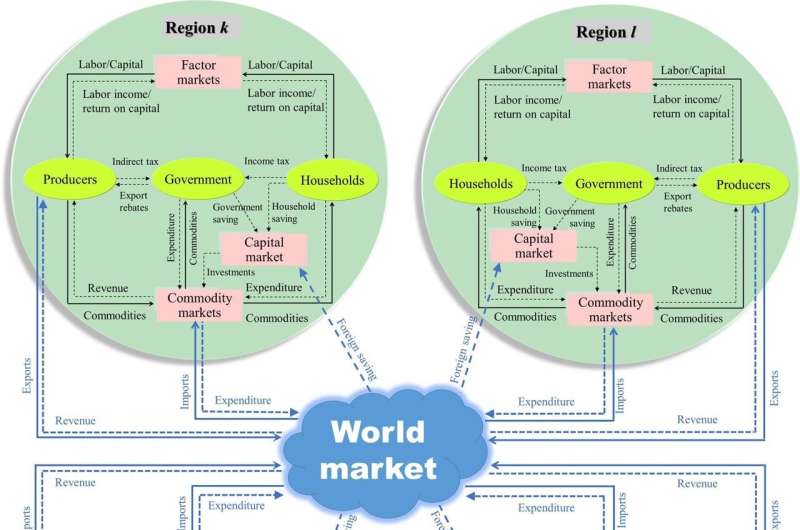This article has been reviewed according to Science X's editorial process and policies. Editors have highlighted the following attributes while ensuring the content's credibility:
fact-checked
peer-reviewed publication
proofread
Energy crisis could become a win-win situation for climate and the economy

Since the Russian attack on Ukraine almost a year ago, there is no shortage of pessimistic forecasts for the climate and for the economy: Geopolitical tensions might eclipse the fight against global heating, and oil and gas price shocks might ruin our prosperity. But a new study based on a respected economic equilibrium model concludes that the opposite is conceivable: a win-win situation for climate and the economy. The study, with contributions from the Berlin-based climate research institute MCC (Mercator Research Institute on Global Commons and Climate Change), has now been published in Nature Climate Change.
Retrospectively for the year 2022, the research team calculates how the decline in Russian energy supplies to the EU affects emissions of the most important greenhouse gas CO2, and economic output measured in gross domestic product. The analysis is based on the global equilibrium model C3IAM, which is widely used in international climate research and was developed in China. The starting point is a scenario of a "moderate disruption": According to this, energy supplies from Russia would have plummeted by 61% to 70% in 2022, depending on the type of fossil fuel, and as a result of subsequent easing, this collapse would be reduced by half by 2025.
The model first simulates the reactions of the market: the shortage of fossil energy fuels leads to price increases, lower demand and, to a certain extent, additional supply from other regions of the world. As a result, EU economic output in the year 2022 ends up 1.5% lower in this scenario than in a scenario without Ukraine war and energy crisis, and CO2 emissions end up 12.3% lower. Even in 2025, economic output is still 0.6% lower. So the result is that the climate wins, but the economy loses out.
But this loss of prosperity that is the study's core message can, in principle, be avoided. In fact, the research team also modeled a scenario in which the EU and national governments would have initiated a particularly large energy-saving action in 2022. This assumes that fuel consumption of passenger cars in the transport sector, as well as energy consumption of private households and service companies in the building sector, would have fallen by 10%.
"Policymakers can reinforce the trend toward energy saving, which would occur anyway due to higher prices, by setting targets or recommendations," explains Felix Creutzig, head of the MCC working group Land Use, Infrastructure and Transport, and co-author of the study. "In doing so, it may, for example, target the social norm for the default indoor temperature, or push for savings on the roads through speed limits and car-free Sundays. Such a demand-side response could quickly reverse the negative economic tide caused by an energy crisis."
According to the model study, EU-wide CO2 emissions in 2022 would have ended up as much as 14.8% lower than it would have been the case without Ukraine war and energy crisis, instead of 13.3% in the scenario without energy-saving action. The loss of economic output would have been reduced from 1.5% to 0.8%, and in 2025 there would even be a plus of 0.3%. In other words, the result would be that both the climate and economy win.
Even in a similarly calculated "strong disruption" scenario, with Russia's energy supplies to the EU in 2022 falling by 90% and an equivalent energy-saving action, there is only a mini-loss of 0.1% of economic output in 2025. The study also quantifies how the EU can divert money from Russia's budget to its own through an import levy on remaining supplies.
"If properly designed, the disengagement provoked by Moscow certainly offers the opportunity to accelerate the European Green Deal and the path towards climate neutrality," concludes Ottmar Edenhofer, MCC Director and also a co-author of the study. "The EU should actively promote this."
More information: Li-Jing Liu et al, Carbon emissions and economic impacts of an EU embargo on Russian fossil fuels, Nature Climate Change (2023). DOI: 10.1038/s41558-023-01606-7
Journal information: Nature Climate Change
Provided by Mercator Research Institute on Global Commons and Climate Change (MCC) gGmbH




















